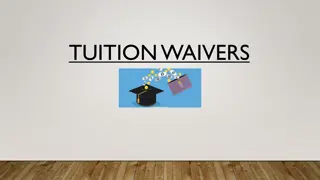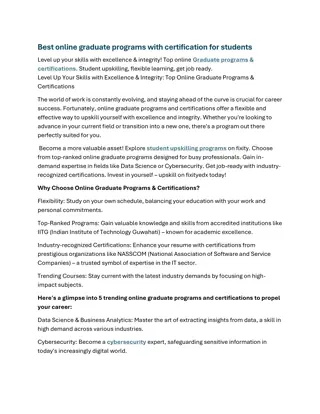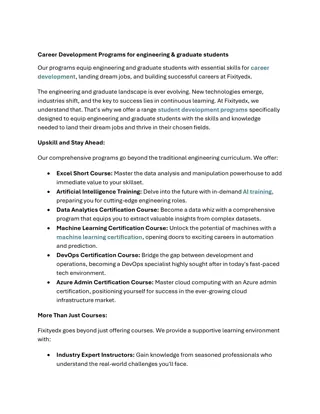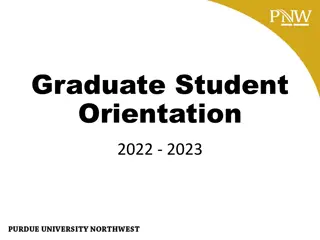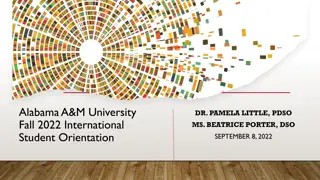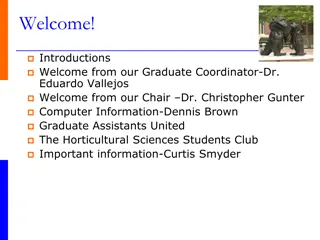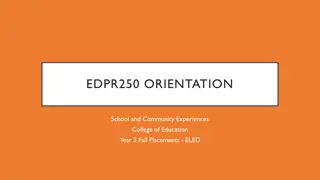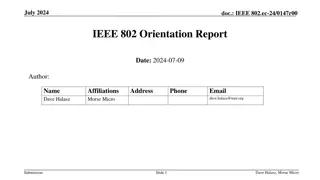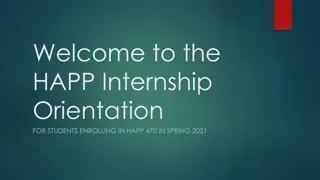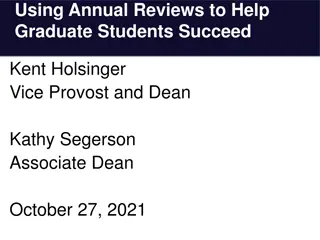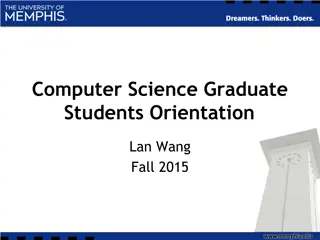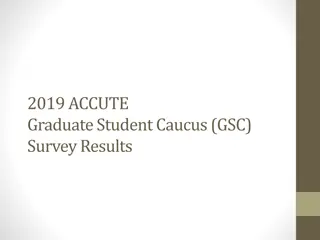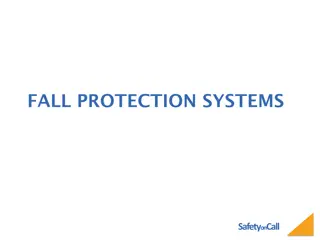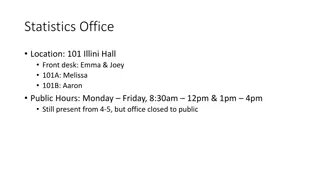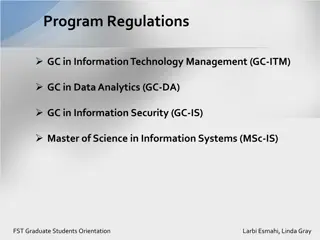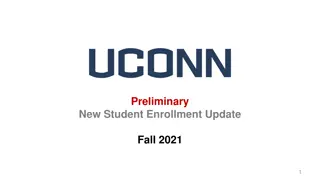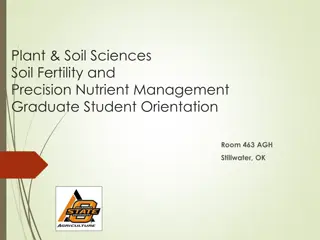Graduate Student Orientation Fall 2021 - CS Department Overview
The Graduate Student Orientation for Fall 2021 at the CS Department led by Dr. Scott Fleming covers essential topics such as department mission, degree programs, faculty research areas, research impact indicators, and research opportunities within the department. Learn about the CS Department's high-impact research, effective teaching strategies, and service to the university, research, and community. Explore the various undergraduate and graduate degree programs offered, faculty research interests, and discover research opportunities available within the department. Detailed information on academic advising, pitfalls to avoid, and getting started in your first semester is also provided.
- Graduate Student Orientation
- CS Department
- Research Opportunities
- Academic Advising
- Faculty Research Areas
Download Presentation

Please find below an Image/Link to download the presentation.
The content on the website is provided AS IS for your information and personal use only. It may not be sold, licensed, or shared on other websites without obtaining consent from the author. Download presentation by click this link. If you encounter any issues during the download, it is possible that the publisher has removed the file from their server.
E N D
Presentation Transcript
Graduate Student Orientation Dr. Scott Fleming Fall 2021
Agenda About the CS Dept Degree Requirements Academic Advising Pitfalls to Avoid Getting Started (Your First Semester)
Agenda About the CS Dept Degree Requirements Academic Advising Pitfalls to Avoid Getting Started (Your First Semester)
CS Department Mission High-Impact Research Effective Teaching Service University, Research, and Community
CS Degree Programs Undergraduate Degree Bachelor of Science (B.S.) Graduate Degrees Master of Science (M.S.) Doctor of Philosophy (Ph.D.) Graduate Certificates Cyber Security and Information Assurance Data Science
Faculty Research Areas Bio-Inspired Computing Bioinformatics Computer Science Education Cybersecurity Cybersecurity Education Human-Computer Interaction Intelligent Systems Internet Architecture Machine Learning Mobile Health Natural Language Processing Software Engineering Theoretical Computer Science Wireless Sensor Networks
Research Impact Indicators Publication All publish in peer-reviewed science journals & conferences Many works appear in top-ranked publication venues Well cited by other researchers Funding Grants from NSF, NIH, NASA, DARPA, ONR Ranked 55th in the nation in federally funded research programs Dept with most funding per faculty at UofM
Discover Research Opportunities Department Research Overview https://www.memphis.edu/cs/research/ Research Groups Directory https://www.memphis.edu/cs/research/research_groups.php Faculty Profiles and Websites https://www.memphis.edu/cs/people/
CS Faculty William Baggett Amy Cook Dipankar Dasgupta Scott Fleming Associate Chair/Graduate Coordinator Max Garzon Xiaolei Huang New! Nirman Kumar Santosh Kumar Weizi Li Kriangsiri Top Malasri Advising Coordinator Christos Papadopoulos Vinhthuy Phan Vasile Rus Fatih Sen Sajjan Shiva Deepak Venugopal Data Science Cert. Coord. Lan Wang Chair Thomas Watson Myounggyu Won Kan Yang Cyber Security & Info Assurance Cert. Coord. James Yu Xiaofei Zhang
CS Dept Office & Secretary Main Office: 375 Dunn Hall Notice Board outside Secretary: Rhonda Smothers <rsmothrs@memphis.edu> Submit forms to her You will be seeing a lot of her! Be nice to her!!
CS Dept Events CS Social Fall event Party with games & food CS Research Symposium Spring event Student posters, presentations, exhibits (& food!) CS Colloquium & Reception Fridays 12:30-2:00 Invited speakers on various CS topics Snacks!
Agenda About the CS Dept Degree Requirements Academic Advising Pitfalls to Avoid Getting Started (Your First Semester)
Caution! This is only a summary! Omissions and ambiguities possible! Official source: The Graduate Catalog https://catalog.memphis.edu/ Get familiar with it!
CS Masters Degree Masters of Science (M.S.) in Computer Science Overview: Coursework Project or Thesis
Masters Project versus Thesis Project Find project advisor Form committee Project report Project presentation/defense Thesis Find thesis advisor Form committee Thesis Thesis defense Main difference: thesis has higher expectations regarding research contribution, quality of writing, and worthiness of publication
M.S. Requirements 33 credits Core Requirement: COMP 7012, 7212, 7612, 7712 At least 3 with B- or better 3 credits of Project (COMP 7980) or Thesis (COMP 7996) Max 6 credits of non-coursework (project/thesis/independent studies, etc.) Max 6 credits of 6000-level courses Comprehensive Exam: Project Report/Presentation or Thesis/Defense
Model M.S. Program Year 1 Focus on courses Complete Core Requirement Year 2 Find project/thesis advisor (earlier is better) Form project/thesis committee (with help of advisor) Mix courses and project/thesis work Optionally take 3-credit Independent Study to work on project/thesis Complete Comprehensive Exam during last semester
CS Ph.D. Degree Doctor of Philosophy in Computer Science Overview: Research, research, research! Apprenticeship with advisor Some coursework
Ph.D. Requirements 72 credit hours 9-18 credits COMP 9000 (Dissertation) Min 12 credits 8000-level courses (other than 8901) Max 21 credits Independent Studies Max 6 credits 6000-level courses Qualifying Exam: 4 core courses with B or better Comprehensive Exam: Dissertation Proposal Final Dissertation/Defense
Model Ph.D. Program Year 1 Find research/dissertation advisor Complete Qualifying Exam (Core Requirement) Year 2 3 Conduct formative research with advisor (Ind Studies COM 8901) Publish paper(s) Complete Comprehensive Exam (Dissertation Proposal) by end of Year 3 Year 4 5 Conduct and publish proposed dissertation research Take dissertation credits (COMP 9000) Complete Dissertation/Defense by end of Year 5
M.S. on the Way to Ph.D. Use first 2 years of Ph.D. to complete M.S. thesis Benefits: Additional M.S. degree Little/no extra time or cost Add thesis to resume Thesis can be published as paper(s) Serves as formative dissertation work for proposal Discuss this option with your advisor!
Caution! Not All Courses Count Some COMP courses do not count Admission pre-req courses Non-major courses: COMP 6001, 6005, 6014, 6011, 6030, 6040, 6270, 6601, etc. Cognitive Science Seminar (COMP7/8514) Only counts if closely related to CS or your research Advisor pre-approval required Non-COMP courses Rule of thumb: May count 1 for M.S. or 1 2 for Ph.D. if relevant to degree, but must have pre-approval of advisor & Graduate Coordinator Warning! Easier versions of COMP courses from other departments will not be approved (e.g., MIS databases)
Agenda About the CS Dept Degree Requirements Academic Advising Pitfalls to Avoid Getting Started (Your First Semester)
Academic Advisor Guides you through the degree program Answers your questions Approves certain things Clears your registration pin At the minimum, you should have an advising meeting once per semester Advisor reviews/approves courses for next semester Advisor makes sure you're on track, provides guidance Advisor won't clear registration pin until meeting happens! Always get your advisor's approval when making decisions!
Advising Questions First, ask your advisor If your advisor doesn't know, you and your advisor may together ask the Graduate Coordinator Idea here is that the advisor learns the answer as well as student
Changing Academic Advisor You are assigned an advisor when you enter the program If no advisor yet, request from "Top" Malasri <kmalasri@memphis.edu> When you find a faculty who agrees to be your research/project advisor, change your academic advisor to be that person Procedure for changing: Make sure new advisor agrees and old advisor is aware Email advisor change request to "Top" Malasri <kmalasri@memphis.edu>, CCing both new and old advisors It is possible to subsequently change your research/project advisor New advisor must agree If old advisor is providing a GA, you must finish out contract
Agenda About the CS Dept Degree Requirements Academic Advising Pitfalls to Avoid Getting Started (Your First Semester)
Dissertation (COMP 9000) Restrictions You cannot register for COMP 9000 until you have completed the Comprehensive Exam (Dissertation Proposal) Once you start taking COMP 9000 credits, you must take at least one COMP 9000 credit every Fall and Spring semester until graduation If you miss a semester, at time of graduation, you will be forced to retroactively purchase credits for those semesters
Min Course Load for International Students Min of 9 credit hours per semester International graduate students may take fewer than 9 credit hours only if they have met all coursework requirements dissertation-only, thesis-only, or final-project-only credits remaining Implies that Ph.D. students have passed Comprehensive Exam
What to Call Faculty By default, call faculty Dr. Lastname or Professor Lastname It is common for some faculty to have you call them by their first name, but do so only with their permission
Grade Requirements Min GPA of 3.0 Max of 2 C+/C/C- grades can count No D+/D/F grades can count Enforced by the Graduate School no exceptions are allowed!
Academic Probation GPA < 3.0 Academic Probation Recovery Process Each semester on probation, must submit a recovery plan to advisor and CS Graduate Coordinator/Committee for approval May be required to participate in a hearing with the CS Graduate Committee Two consecutive semesters on probation may result in dismissal from the degree program Some advice: Work hard, don't overload yourself, and mind your grades Seek advice/help from course prof or advisor if in trouble
Academic Dishonesty Serious matter zero tolerance! Some examples of plagiarism/cheating: Representing the work of another as your own Direct copying the work of another person Paraphrasing the ideas of another person Recycling previously submitted work Potential consequences F grade cannot be removed Appear before university committee Dismissal from degree program/university Code of Rights: https://www.memphis.edu/osa/students/code-of-rights.php
Agenda About the CS Dept Degree Requirements Academic Advising Pitfalls to Avoid Getting Started (Your First Semester)
TODOs for Your First Semester Meet your advisor ASAP! Complete the Programming Skills Test Apply for transfer credits (if applicable) Request core course waivers (if applicable) (PhDs) Apply for Approved Master's credits (if applicable) (PhDs) Submit the Curriculum Planning Form
Programming Test Make sure you can write programs that run 1 week before semester begins 1 hr test on computer Java, C or C++ (ask if you want to use other language) You must either Pass the test within your first 2 attempts Take a programming course (chosen by the department) and get a B or better (B- do NOT count) Remember, this course does NOT count towards the degree Students who have not passed programming test cannot be department GA
Transfer Credits Consult with advisor if have taken graduate CS courses elsewhere Must be CS relevant and not used to fulfill another degree For Masters students: at most 12 credits For Ph.D. students: at most 36 credits Must be applied for with help of advisor Will appear on transcript if accepted
Core Course Waivers If you have taken a graduate course elsewhere that is equivalent to a core course, you may request a waiver A core course waiver removes the requirement that you must take that core course Note: The credit requirements for the degree remain unchanged Applications for waivers must be reviewed and approved, first, by your advisor and, then, by the Graduate Coordinator
PhD Curriculum Planning Form Complete with help of advisor Submit during first semester Must be approved by advisor, graduate coordinator, and department chair Must be updated and approved again after completion of Qualifying Exam
Approved Masters Degree Courses and requirements similar to our MS degree If approved, up to 33 credit reduction of the 72 required credits Approval process: Give your transcript to advisor for evaluation in first semester Advisor makes recommendation to the graduate committee over email along with your transcript and number of credits to be counted Graduate Committee reviews and approves/rejects If approved, document in PhD Curriculum Planning Form Note: You can use a UofM CS Master's
Closing Thoughts Meet with your advisor Familiarize yourself with the Graduate Catalog Welcome to the CS Department! Have a great semester!


